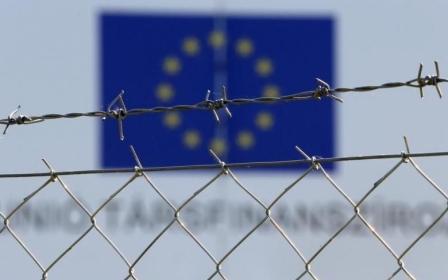Britain to set out legal justification for drone attacks

The UK's Attorney General is to set out the legal basis for military strikes against overseas targets for the first time.
Jeremy Wright QC will on Wednesday argue that new technological threats mean the battleground is "irretrievably altered" and that it is necessary for the UK to use lethal force abroad.
"The UK is a world leader in promoting, defending and shaping international law - and for the first time we are setting out how we determine whether an attack is imminent," Wright will say in London.
The frontline has irretrievably altered. Technology has made it easier for terrorists to carry out attacks.
"We are a long way from being able to see troops massing on the horizon. The frontline has irretrievably altered. Technology has made it easier for terrorists to carry out attacks.
"The law has to keep up with the changing times. The government has a primary duty to protect the lives of its citizens. But it can only use lethal force where there is a clear legal basis for doing so."
Scrutiny of legality of strikes abroad has intensified since September 2015 when then prime minister David Cameron revealed that an RAF drone had killed two British militants in Syria in August.
Reyaad Khan and Ruhul Amin were killed when the strike was launched by drone near the Islamic State stronghold of Raqqa.
Amnesty International condemned the attack, saying it was "extremely alarming that the UK has apparently been conducting summary executions from the air".
MPs and peers have called for ministers to clarify the legal basis for drone strikes, citing a lack of oversight.
Wright's speech in London on Wednesday will lay out the legal basis for such attacks in greater detail than ever before.
More drones for Britain
In early December, Britain announced it was to double its fleet of armed drones, agreeing a $127m deal for a new generation of US-made aircraft for the Royal Air Force.
The defence secretary, Michael Fallon, said the government planned to arm the new Protector drones with advanced Brimstone missiles and Paveway laser-guided bombs.
Fallon's ministry said the aircraft is being developed by the US firm General Atomics, which manufactures the Reaper drone at present in use in the US and UK air forces.
The UK currently has 10 Reapers in service, which the Protectors are scheduled to replace in 2021.
"Britain faces ever-evolving threats and we must look at innovative solutions to stay ahead of our enemies," Fallon said.
"Doubling investment in our unmanned air fleet will substantially enhance both the intelligence gathering and firepower of the RAF.
"The UK’s security partnership with the US is the deepest and most advanced of any two nations on earth.
"This programme is part of a further strengthening which will help keep Britain safe and secure."
According to Janes, the British government announced initial plans in April to buy up to 20 of the new drones in a $528m programme lasting seven years.
The defence ministry said the Protector "will offer improved range and endurance, greater weapons capacity, automated take-off and landing and better resilience against the elements".
Janes said Protector has a maximum endurance of more than 40 hours compared with the Reaper's 27 hours, but a lower top speed and altitude - suggesting the UK is prioritising increased endurance and persistence in future operations.
The use of British-made Brimstone missiles would significantly increase the firepower of the new drones. Predators and Reapers currently carry the inferior "Hellfire" missile.
Fallon made the announcement at the annual Reagan National Defence Forum in California.
Stay informed with MEE's newsletters
Sign up to get the latest alerts, insights and analysis, starting with Turkey Unpacked
Middle East Eye delivers independent and unrivalled coverage and analysis of the Middle East, North Africa and beyond. To learn more about republishing this content and the associated fees, please fill out this form. More about MEE can be found here.




